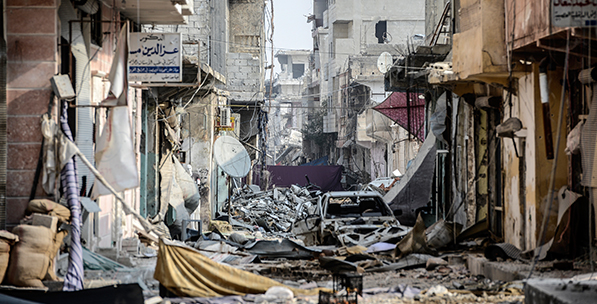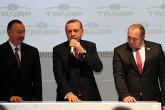The atrocities in Syria have already reached an inconceivable level. Leading actors of the world order, however, have remained silent and pretend that the problem does not exist. It is clear that the issue cannot be ignored any more. The Syrian war is no longer a regional problem, it has transformed into a major global issue. The biggest victims of this war, as in every war, have been innocent people. A total of 250,000 people have died, and three million have had to leave their country. The number of people who have forcefully been displaced in Syria stands at nine million. It is a bitter and depressing picture.
Unfortunately, despite this bleak situation, the West continues to view the Syrian losses and the emergent refugee issue as a regional issue. Even though the issue of Syrian refugees is seen today as Turkey’s problem, the impact of this problem on the global system is being felt and will be felt more with every passing day. There is another problem apart from the issue of Syrian refugees that is considered more urgent in today’s global order. It is the issue of the “internationalization of terrorism” and “foreign fighters.” The latter are considered important due to the possibility of the “transportation of the war to the West.” This is an issue that has been fed and fostered by the Syrian war following the Iraq war.
There is a genuine concern over the fate of foreign fighters – individuals who were born and raised in Western countries and head to Syria after adopting a radical ideological stance – after they return home. However, the securitization of Muslims and the perception of Muslims as a potential threat around the world – in Western countries in particular – have been justified by the above concern and have, in turn, introduced new problems. There is a transformation that occurs from a modern society “valuing rehabilitation” to a modern society “valuing fear” and generating public policies accordingly.
Another reason why the Syrian war has transformed from a regional into a global issue is the formation of a new cold war order in which the actors are the U.S., Russia, Saudi Arabia, Iran and Turkey. The leading actors of the global order initially perceived the Syrian war as a “domestic issue.” In the beginning, the Syrian war was narrated as a prolonged battle between the regime of Syrian President Bashar Assad and the Syrian opposition. Although the Assad regime is not regarded as palatable by the Western hegemony, the cost was considered much heavier if Syria were to surrender to the natural sociology of the Islamic world. The Assad regime was deemed as the lesser of two evils and preferable to a picture similar to the ones in Egypt and Tunisia.
The Syrian war eventually began to be viewed as a “regional problem.” The reason for this is that Syria became a ground where regional and global powers are engaged in a war of influence and hegemony. Syria has morphed into a default medium for a power struggle between the U.S. and Russia, and between Iran and Saudi Arabia.
It may be considered a positive development to regard the Syrian war at the end of its fourth year as “a regional problem” rather than an “internal issue.” However, the dimension and importance of this issue in terms of the global system lay bare the fact that the Syrian war has not yet been discussed in the correct terms. The war is a global problem. Unless it is regarded as such, there is no chance of resolving it.
[Daily Sabah, March 19, 2015]
In this article
- Foreign Policy
- Opinion
- 2015
- Assad Regime
- Bashar Al Assad
- Cold War
- Daily Sabah
- Egypt
- Foreign Fighters
- Global Actors | Local Actors
- Global Power
- Hegemony
- Iraq
- Islam
- Islamic
- Islamic Republic of Iran
- Middle East
- Muslim
- Opposition
- Russia
- Saudi Arabia
- Syria
- Syrian Civil War
- Syrian Conflict
- Syrian Crisis
- Syrian Opposition
- Syrian Refugees
- Syrian Regime
- Terrorism
- Tunisia
- United States (US)
- War
- Western Countries
- Western Hegemony
- Western World



